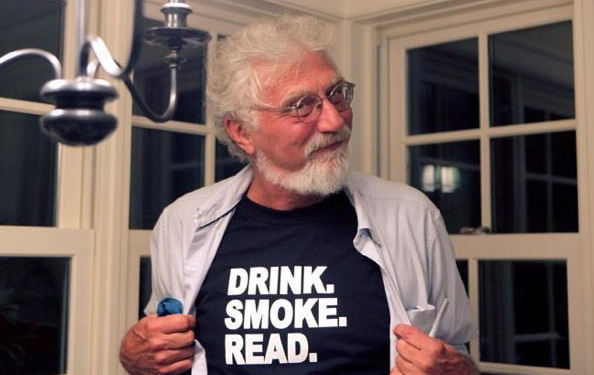Bob Shacochis is a contributing editor for both Outside and Harper’s. He is the author of two short story collections, Easy in the Islands and The Next New World; a novel, Swimming in the Volcano; and a collection of essays about food and love entitled Domesticity. His most recent book, The Immaculate Invasion, about the 1994 military intervention in Haiti, was recently a finalist for the New Yorker Magazine Literary Awards for best non-fiction book of the year, and named a Notable Book of 1999 by the New York Times. He has also won the National Book Award for First Fiction, the Rome Prize in Literature from the American Academy of Arts and Letters, and a National Endowment for the Arts Fellowship. A former Peace Corps volunteer in the eastern Caribbean, Shacochis holds an MFA from the Iowa Writers Workshop, and currently teaches in the graduate writing programs at Bennington College and Florida State.
How did you get started traveling?
Ocean City, Maryland, Virginia Beach, the Outer Banks of North Carolina — the beach was everything when I was growing up in northern Virginia. Every summer my family would head off to the coast, and by the time I was 12, surfing was everything, especially after I got my first board (a Greg Noll Waverider, about twice as long as I was) and my father took us all to Hawaii when I was 15. Once I got my driver’s license, I bought a VW and would head for the coast every Friday after school…then Florida and Long Island in the summer. By the time I was 17, I was taking off overseas on my own, against my parents’ wishes, to go surfing in the Virgin Islands and Puerto Rico. After college, I hit the road to South America (for waves) and then joined the Peace Corps and was sent to Barbados and other Windward Islands, my prime motivation being, of course, waves, waves, waves.
How did you get started writing?
Everybody gets started writing in school. If you get As in English class, you go on. If you’re a bookish kid, like I was, sooner or later you get the urge to contribute to the banquet feast of literature. Myself, I worked for my high school newspaper, then went to journalism school at the University of Missouri, joined the Peace Corps as an agricultural journalist, then said fuck it and after several attempts finally was admitted to the Iowa Writers Workshop.
What do you consider your first “break” as a writer?
Iowa was my first big break. Worked with great teachers — Barry Hannah, James Alan McPherson — caught the eye of a few literary lions like Robert Stone and John Irving, got an agent, started publishing short stories in the New York mags by my third semester. When my first book, Easy In The Islands, came out in 1985, I began to get calls from editors at all the big mags asking if I was interested in nonfiction assignments overseas. The surfer in me immediately responded — Are you shitting me? Send a plane ticket!
As a traveler and fact/story gatherer, what is your biggest challenge on the road?
I dunno — armed checkpoints? gunplay? burning out translators and fixers? trying to nail down appointments with government ministers? becoming too enamored with the muddle? Probably the biggest challenge is emotional — leaving behind the friends you’ve made, the people who were generous and courageous enough to help you, knowing you would one day go back to a better world and they were eternally trapped in the tempest.
What is your biggest challenge in the research and writing process?
The biggest challenge in the research process is to let go, to stop, to say enough, and then to reduce all of that beloved labor down to a few succinct paragraphs that shape the background to your narrative. I love research — that’s all the fun, especially in the field. To write, however, is to suffer, and my pieces usually come in thousands of words over the assigned length. That’s a serious flaw in my writing process — shaping and disciplining the footlockers of material one has so happily gathered.
What is your biggest challenge from a business standpoint? Editors? Finances? Promotion?
Promotion? What’s that? Editors? I’ve worked with three or four editors I adore but most of them couldn’t teach a freshmen English class. Finances? It amazes me that editors get paid in a timely fashion for their work and are therefore enabled to pay their bills in a timely fashion and that writers and photographers are almost never paid in a timely fashion, as if we have no bills to pay in a timely fashion.
Do you, or have you ever done, other work to make ends meet?
If I didn’t teach, the ends would not meet.
What travel authors or books might you recommend and/or have influenced you?
I don’t have a stock answer for this question. Read every travel book you can get your hands on, starting with Homer and Virgil and the Bible, working your way through the centuries to Rory Stewart. Everything you read is, finally, influential.
What advice and/or warnings would you give to someone who is considering going into travel writing?
Love humanity, cultivate tolerance, hate injustice. Serve language, not word counts, and don’t just skate around on the glossy surface of things. Say yes to everything but hookers and drugs. To hookers and drugs say…maybe. If an editor tells you the audience you are writing for is composed of idiots who need every little obvious thing spelled out endlessly, tell the editor to go fuck himself/herself.
What is the biggest reward of life as a travel writer?
Living. Living a life that is neither small nor fearful.

